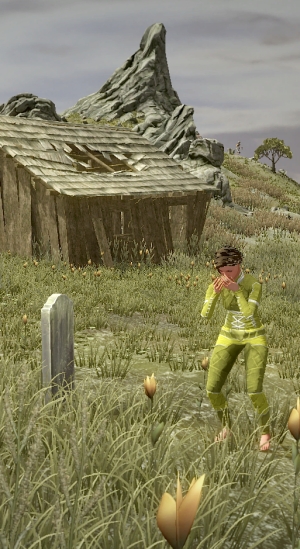
Out of all the titles that I’ve played for Choose My Adventure, Project Gorgon is probably the earliest in its development cycle. It’s also, by a sizable margin, the best in show. If you’re looking for a quick ringtone-style clip to take away from this column, that would be the one.
That doesn’t mean I don’t have a lot of criticisms of the game, nor does it mean that this is a game which will delight and amaze everyone who plays it. I have a somewhat biased starting point anyway because I talk about this subgenre for a living, and thus I have certain tastes that not everyone is going to share. That isn’t meant as a brag; that’s meant as a self-admonishment because these are things no one should really care about all that much.
Still, here I am, here this game is, and I am happy to pronounce it the best of all the Choose My Adventure games that I’ve played for this feature so far – albeit with the slight caveat that it won’t be able to hold onto that title forever if it doesn’t actually address some of the issues that I noticed while playing.
 See, that’s the thing about evaluating a title this early in its development cycle; there’s still a lot of stuff that’s subject to change in either direction. Once a game is live, it’s at least relatively locked into place; when playing Project Gorgon, there’s the little asterisk in my mind reminding me that any critiques I might have are potential points of discussion, barring perhaps the graphics.
See, that’s the thing about evaluating a title this early in its development cycle; there’s still a lot of stuff that’s subject to change in either direction. Once a game is live, it’s at least relatively locked into place; when playing Project Gorgon, there’s the little asterisk in my mind reminding me that any critiques I might have are potential points of discussion, barring perhaps the graphics.
And yeah, the graphics are an issue. This game is, I’m sorry to say, pretty darn ugly. It does the best it can with what it has in terms of resources, that’s not really a mark against the game in itself, but it’s important to be aware of when you try to sell someone on the game. Small indie title on small indie budget.
Beyond that, the two biggest issues that the game has are guidance and grind, which require a careful hand to tweak in either direction. Too much guidance discourages the exploration that lies at the heart of the game; too little guidance leaves you unsure of what you’re supposed to be doing in the first place. Some of this is exacerbated by aspects like the hidden nature of many skills; if you don’t know that the skills are there in the first place, you’re discouraged from trying to unlock them, and even if you know they exist it can be difficult to puzzle out where you’re supposed to go.
It can also be hard to puzzle out exactly what you’re supposed to do next if you’re having a hard time with something, as I’ve mentioned in the past. It’s very easy to be dying to a specific enemy and not have a clear picture of what will cause you to not die, which gets frustrating. There’s a lot of fun to be had with exploring, but there comes a point where you’re just knocking your head against the game and begging for, like, a pointer.
Yet these are things that can be fixed, and since the game is just moving into early access, one can only assume with time that these things will probably be addressed. The team isn’t afraid to lean out far for something weird, and the early test cycle seems to have mostly been about finding the limits of that weirdness.
Said weirdness makes the game a lot more endearing, though, and that’s a big part of what I like about the title. It’s not just that the game is willing to find something strange, it’s that the game is willing to find something strange and then make it work within the larger context of the game as a whole. It’s got a bizarre melange of stuff, but it works overtime to make that melange comprehensible and fun, not just obnoxious.
That’s without getting into how much I like the game’s sense of world and narrative. No, it’s not a story-based game, but it definitely has the feel of the game worlds I’ve always enjoyed. There might be lots of weird things going on, but people remain basically and fundamentally people and operate as such. The NPCs narrate their goals and wishes with colorful verve, and I could have spent a whole column just talking about those little touches, like the orcish “traitor” who insists that his prices aren’t meant to be good, they’re fair! Or the gardener clearly regretting a variety of her life choices, or the guard captain who just oozes “waiting for retirement since his first year on the job,” or…
It would be very easy for Project Gorgon to fundamentally just have an excuse setting and plot, but the work put in to making it feel alive really endears it to me. It never leans on wackiness or instability as a point of pride; it plays with what it has to show off and focuses on making its NPCs feel distinct, not just like functional dispensaries for skills or whatever.

Combat, in general, isn’t great but is very far-reaching. The skill system is unique and different, even if it can feel pretty grindy a lot of the time (and a lot of that grinding feels like it’s not serving much of anything, which doesn’t help; lots of empty levels can be discouraging). It feels like an old-school game simply in that you find out what’s doable and what’s not partly by probing the edges and seeing what bites back.
But it also does all of that without ever falling into the sometimes punishing mechanics of the past out of habit. The game always feels lively and novel, even as it clearly leans on familiar old tropes. There are problems, but those problems always feel like they really could just be artifacts of the game’s early development stage rather than symptoms of a core sickness.
I can’t tell you if you’re going to like the game, honestly. If you really want a guided experience, you won’t. If graphics or combat are a huge deal to you, neither one will amaze. And if polish and refinement are what you look for above all else, you’re going to want to give this one a hard miss.
Me, though? I’m picking this up for money on Steam as soon as that option becomes available. This isn’t the first time that I’ve covered a game where spending a dime was not strictly necessary, but this is the first time where I’ve decided that I don’t need to pay money but I really, really want to. I am fond of this game and want it to succeed. And for all my criticisms, it’s a grand experience.
The funny thing is that it’ll be sitting in my library alongside Shroud of the Avatar, another title that wants to draw from older inspirations but manages to bring all of the worst from the old and little of the good. The comparison tickles me.
The next wave

We’re moving on to the next voting tier, and as I did last time, I’m putting Final Fantasy XI on the list. This is, again, an old-school game, but rather than being a throwback to earlier days it was actually there in the earlier days. It was also my earliest days, so I’d be taking a different tactic with this than normal, but one that should still be interesting. Especially if, say, you like guides as well as evaluation.

Of course, I could dive into territory I’ve never touched before. Warframe might not be a fully featured MMORPG yet, but even that’s debatable, and over time it’s only moved into that camp instead of away from it. I’ve never so much as touched it, but I’ve heard good things, so perhaps it’s something I would groove on.

And last but certainly not least, there’s Blade & Soul. I have played it a bit and was impressed by the game when I first saw it sitting in a hotel in California; since then it’s done rather well for itself, but my own experiences with it were rather perfunctory. Would a more in-depth examination lead to greater appreciation or not? There’s only one way to find out!
Specifically, the only way to find out is to cast your vote below.
CMA: What's our next destination?
- Warframe (39%, 87 Votes)
- Final Fantasy XI (29%, 65 Votes)
- Blade & Soul (32%, 73 Votes)
Total Voters: 225
Voting will remain open through the weekend until 6:00 p.m. EST on Sunday, so you have plenty of time to cast your vote and check in. As always, feedback is welcome by mail to eliot@massivelyop.com or just from the comments down below.















